Nusrat Fateh Ali Khan often hailed as the "King of Qawwali," was a legendary Pakistani singer who played a pivotal role in bringing Sufi devotional music to a global audience. Born on October 13, 1948, in Faisalabad, Pakistan, Nusrat hailed from a family with a rich tradition of Qawwali, stretching back over 600 years. His …
An Inside The Life Of Nusrat Fateh Ali Khan- Paying Tribute On His 27th Death Anniversary
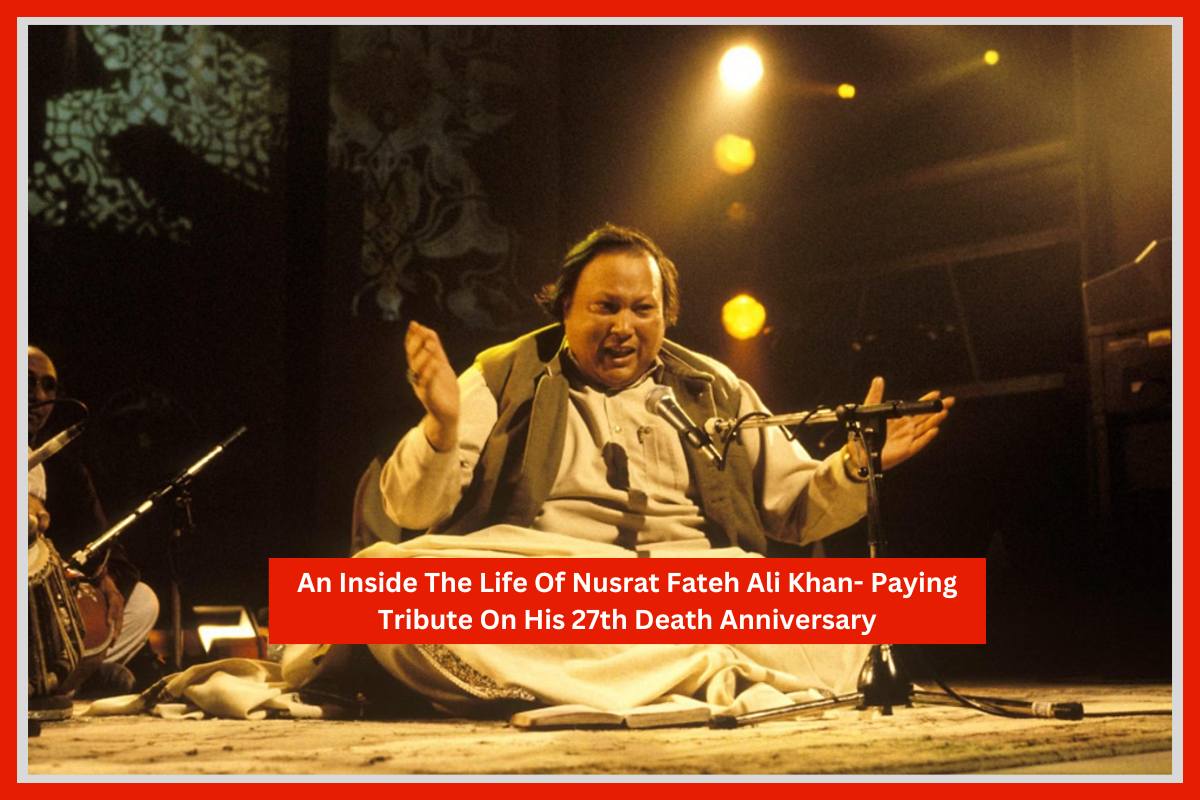
Nusrat Fateh Ali Khan often hailed as the “King of Qawwali,” was a legendary Pakistani singer who played a pivotal role in bringing Sufi devotional music to a global audience. Born on October 13, 1948, in Faisalabad, Pakistan, Nusrat hailed from a family with a rich tradition of Qawwali, stretching back over 600 years. His exceptional voice and innovative approach to traditional music allowed him to transcend cultural boundaries, making him an iconic figure in both the Eastern and Western music worlds. Today, we are paying tribute to him on his death anniversary, it is clear that his contributions to music inspired countless artists and music lovers worldwide.
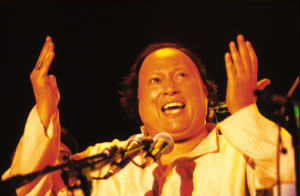
Table of Contents
ToggleBorn On 13 October 1948
Born on October 13, 1948, in Faisalabad, Pakistan, Nusrat Fateh Ali Khan came from a distinguished family with a deep-rooted tradition in Qawwali music that spanned over 600 years. His father, Ustad Fateh Ali Khan, was a renowned Qawwali singer and musicologist, and his family had been custodians of this spiritual music for generations. Despite his father’s initial reluctance, Nusrat’s passion for music was evident from an early age, and he soon embraced the family tradition.
Father’s Death In 1964
His formal training in music began under the tutelage of his father and uncles, who were also esteemed Qawwals. After the death of his father in 1964, Nusrat took over as the head of the family Qawwali party.
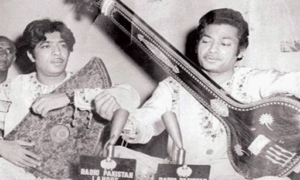
Performance at the World of Music, Arts and Dance (WOMAD) festival
The legendary singer’s breakthrough came in the 1970s when his Qawwali group gained widespread popularity in Pakistan. His unique style, which combined traditional Qawwali with elements of classical music, made him a sensation. His performance at the World of Music, Arts and Dance (WOMAD) festival in 1985 marked his international debut, bringing his music to the attention of global audiences. His collaborations with Western artists like Peter Gabriel further cemented his status as an international icon.
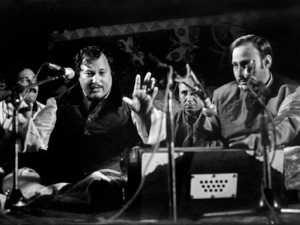
Famous Performances And Songs
Among his vast repertoire of songs, some of his most iconic include “Haq Ali Ali,” which became a massive hit in Pakistan, and “Dum Mustt Qalandar,” a Qawwali that has been cherished by generations. Another standout is “Afreen Afreen,” a romantic Qawwali that gained immense popularity and remains one of his most beloved tracks. His collaborations with Western artists also produced memorable works like “Mustt Mustt,” which blended traditional Qawwali with contemporary music, further solidifying his global appeal.
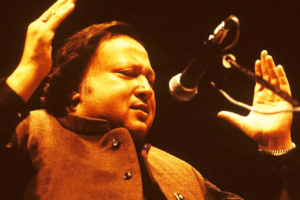
Improvisation In The Form Of Sargam
He was instrumental in modernizing Qawwali by incorporating elements of classical music, and even Western genres, into his performances. His use of improvisation, particularly in the form of Sargam (solfege), added a new dimension to Qawwali, making it more accessible to audiences unfamiliar with the genre. Nusrat’s music was a bridge between East and West, and he is credited with popularizing Sufi music worldwide.
Pride of Performance And More Awards
Throughout his career, Nusrat received numerous awards and accolades, both in Pakistan and internationally. In 1987, he was awarded the President’s Pride of Performance in Art by the Government of Pakistan. He also received the prestigious Arts and Culture Prize from Japan’s Fukuoka Asian Cultural Prizes in 1996, recognizing his contributions to cultural exchange through music. His influence extended beyond Qawwali, earning him recognition as one of the most significant musicians of his time.
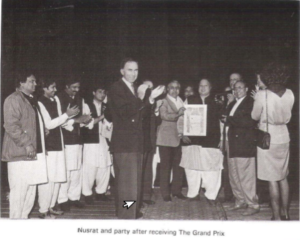
Unknown Facts About Nusrat Fateh Ali Khan
- World Record Holder: Nusrat Fateh Ali Khan holds the Guinness World Record for the most Qawwali recordings, with over 125 albums released during his lifetime.
- Western Collaborations: While he is celebrated in the East, Nusrat also had a significant influence in the West. He collaborated with artists like Peter Gabriel on the soundtrack for The Last Temptation of Christ and contributed to the soundtrack of Natural Born Killers.
- Inspiration to Rock Musicians: American rock musician Jeff Buckley famously referred to Nusrat as his “Elvis.” Buckley idolized Nusrat and even incorporated elements of Qawwali into his own music.
- Unreleased Songs: Several Western artists, including Justin Timberlake and the Red Hot Chili Peppers, wrote tribute songs for Nusrat that have never been released.
- Cultural Ambassador: Nusrat was not just a musician but a cultural ambassador. His performances in countries like Japan and France helped to introduce Qawwali to audiences that had never encountered it before.
Death And Final Days
Khan’s health began to decline in the 1990s due to kidney and liver problems, conditions that were exacerbated by his heavy touring schedule. In August 1997, while on his way to Los Angeles for a kidney transplant, Nusrat was admitted to Cromwell Hospital in London. Unfortunately, on August 16, 1997, he suffered a sudden cardiac arrest and passed away at the age of 48.

His death was a significant loss to the world of music, and his funeral in Faisalabad was attended by thousands of mourners who paid their respects to the legendary artist.
Keep in touch with our news & offers
Subscribe to Our Newsletter
Thank you for subscribing to the newsletter.
Oops. Something went wrong. Please try again later.





